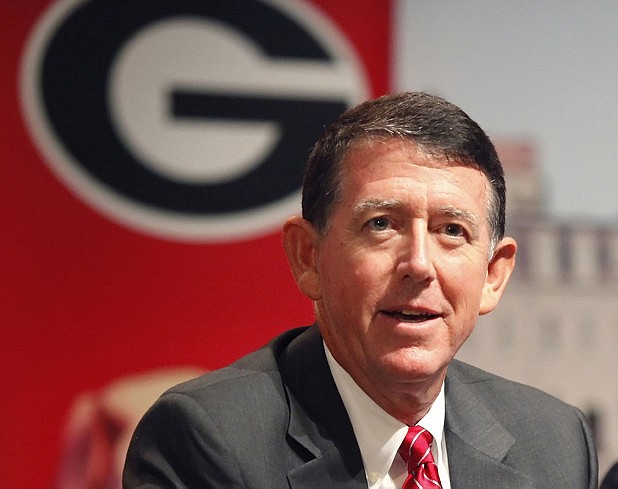The NCAA Division I board of directors voted 16-2 Thursday to restructure how the Atlantic Coast, Big Ten, Big 12, Pac-12 and Southeastern conferences will govern themselves, paving the way for student-athletes to have voices and votes at every level of decision-making.
Georgia athletic director Greg McGarity was a guest Thursday on "Press Row" on ESPN 105.1 The Zone and discussed the historic vote.
Q: What was your reaction to today's announcement?
A: "There is a 60-day period here where this could all be overridden by certain members of the membership, but hopefully it will be smooth sailing after that. I think this is a great day for the student-athletes. It allows them to basically be able to take advantage of some of the wealth that we've been able to generate through the SEC Network and all the tremendous things the conference office has done to drive revenue to the institutions. At the end of the day, you're seeing a situation where we're able to help these young people out.
"A lot of us are already doing it as far as medical expenses and the educational expenses. A lot of us are already able to take care of things once their eligibility has expired. One thing we have not been able to do that we actually did is have 10 or 12 students take advantage of the full cost of attendance stipend that was enacted for a very short time two or three years ago. We would like to be able to do that. We're one of the fortunate schools with the resources to do that, and I think those are the three largest pieces that are getting the most attention now."
Q: What do you envision transpiring between now and January?
A: "There is a consensus among the group that we need to be able to do some things for our young people that we're being restricted to do now because of the schools that don't have the resources. There was an emphasis of creating a level playing field for all 351 institutions, but that's changed now. The emphasis now is what can we do for the student-athletes and how can we change their experience. It's going to create a rift between let's say the haves and the have-nots, but there are probably haves and have-nots within the power 65.
"Even in our conference, you're seeing a tremendous amount of variance in the amount of revenue Alabama generates as opposed to the amount of revenue that Mississippi State generates. Some schools are going to have a lot more challenges than others, even within the 65, but I think we're all in agreement that there are some things we would love to do that we've been restricted from doing in the past and now we have a green light."
Q: Considering the shared desire to protect the NCAA tournament, wasn't this an easy vote?
A: "If there had been a thumbs-down vote today, it would have caused a certain level of disappointment, obviously, which would have caused some other threats to occur and become reality, really. Do we need to create a separate division and basically take our ball and play with it? Everyone has always wanted to be under the NCAA umbrella. A lot of things the NCAA does have not changed with today's vote. The transfer rules are still in place, and the compliance piece is still in place. Entrance requirements are still in place.
"These threats weren't thrown out as a lark. There is a lot of meat on the bone, and thank goodness we don't have to go in that direction. I think everybody is ready to close the book and move forward and that it's the best for everyone."
Q: If cost of attendance is item No. 1, what is item No. 2?
A: "We've talked about the educational piece and being able to take care of the student-athletes, and right now those are the main topics that have been talked about. One thing that helps the student-athletes is that they now have a voice in the process. The SEC will have three representatives from their student-athlete pool, so you will have student buy-in and faculty and athletic representatives giving their voice. You will have athletic directors, and you will have presidents giving their voice. You will have all different angles giving their conversation that may come into play in certain proposals, but there is no question this is a good day for these young men and women."
Q: Kansas State football coach Bill Snyder said this week that that college athletics has "sold out to the cameras." What was your reaction?
A: "I understand where Coach Snyder is coming from, but we're in a situation here where there are very few revenue streams to offer a full-fledge collegiate athletic program. There are limited sources of revenue. At Georgia, football is the gas that drives this engine. Yes, we generate some revenue from men's and women's basketball, baseball and gymnastics, but it's pale in comparison to that, and what gets lost in the shuffle is the amount of resources it takes to fulfill all the dreams of these student-athletes.
"They're going to be a professional in something, and it may not be in sports, as the NCAA commercial says, but there is such an effort to create an atmosphere where these young people can grow up and be productive citizens in our society. That's our job. We've got 600 student-athletes, and what percent are going to be great professional athletes? One or two percent? There is a lot of focus that goes on the 98 percent, so our effort is focused on the full experience."
Contact David Paschall at dpaschall@timesfreepress.com or 423-757-6524.

